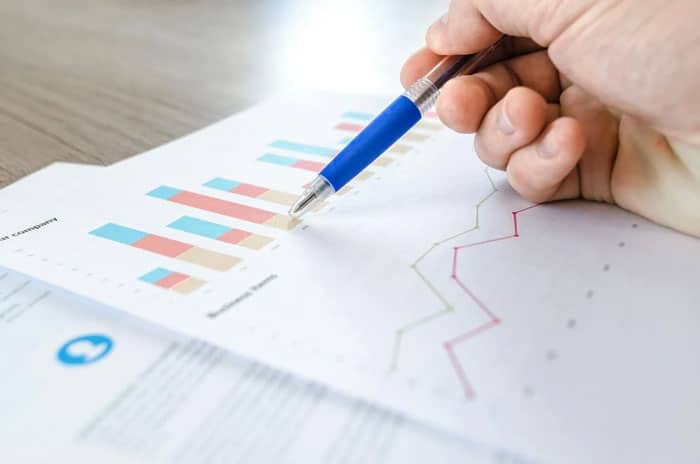
This post provides detailed information on the economics research assistant job description, including the key duties, tasks, and responsibilities they commonly perform.
It also highlights the major requirements you may be expected to meet to be hired for the economics research assistant role.
What Does an Economics Research Assistant Do?
An economics research assistant plays a supporting, yet critical role in helping economists, financial analysts, and organizational leadership make data-driven strategic decisions.
These assistants typically report directly to lead economists or heads of relevant departments within government agencies, economic consulting firms, investment banks, university research centers, public policy think tanks, and other settings.
The economics research assistant job description involves collecting numerical data and economic statistics from reputable sources, organizing information into databases, tables, charts and graphs to facilitate analysis.
It also entails researching economic literature around internal projects and modeling efforts, synthesizing insights into memos, reports and presentations for senior economists to review.
Economics research assistants also apply quality control checks to validate research integrity and accuracy.
In some cases, they may collaborate on economic forecasts, data stories or summary materials that convey complex analytical insights to general external audiences.
While not necessarily developing economic models or policies themselves initially, the productivity of economists, financial analysts and leadership relies heavily on diligent background research, data organization, and administrative support from assistants.
As data continues to drive competitive advantage across industries, organizations find that skilled economics research assistants who can accurately gather, assess, synthesize and communicate economic insights in a timely manner fuels better strategy and decisions overall.
Employers tend to look for assistants with keen attention to detail, strong research expertise, analytical capabilities, communication skills and competency conveying complex data stories to both specialist and general audiences.
An economics research assistant serves in an important supporting role, facilitating the research and analysis of lead economists and data analysts.
Responsibilities span gathering relevant economic data, organizing information, analyzing datasets, synthesizing research, and communicating insights, among additional administrative duties.
The assistant enables greater productivity and more impactful data-driven strategy within an organization.
Economics research assistants typically directly report to lead economists or heads of financial analysis teams within the department or organization where the role sits.
This allows the necessary oversight on projects while enabling senior roles to more efficiently review prepared reports and analysis.
Economics research assistant roles can be found within a range of public sector agencies and private sector companies applying economic strategy and modeling.
This includes government bodies, economic consulting firms, public policy think tanks, investment banks, higher education research centers, and other groups relying on data-driven decision making.
Most economics research assistant positions require at minimum a Bachelor’s degree in economics, statistics, mathematics or another relevant quantitative field from an accredited university.
Strong capabilities and an educational grounding in statistical analysis using Excel, database management, data visualization, research methodologies, and synthesizing technical information are also expected and required to excel in an assistant role.
The core functions of an economics research assistant involves locating and compiling pertinent economic datasets from reputable sources, inputting information into internal databases, and creating digestible tables and charts for analysis,
Their duties also include researching background literature to internal projects, generating draft reports and presentations for review, fact-checking for quality assurance, and occasionally summarizing findings for general external audiences through blog posts and data stories.
In addition to core responsibilities around research, data management and analysis support, economics research assistants may also coordinate projects and communications between departments, help format findings for publications, and organize databases and literature reviews for easier ongoing access.
They may also mentor junior staff joining the team and assist across administrative tasks that ultimately enable greater productivity.
Employers look for economics research assistants who have sharp attention to detail, research expertise, analytical capabilities and superior organizational skills.
Expertise with data analysis tools and databases, strong communication abilities, and high competency with conveying complex information also set candidates apart.
There are no formal regulating bodies specific to economics research assistants.
However, they must ensure research integrity and quality analysis consistent with economics’ codes of conduct and standard practices
Economics Research Assistant Job Description Example/Sample/Template
The economics research assistant job description consists of the following duties, tasks, and responsibilities:
- Collect numerical economic data from reputable government sources, universities, think tanks and other outlets relevant to current modeling, forecasting, and strategy projects
- Organize data sets, input information into internal databases, generate tables/charts to simplify analysis
- Conduct background research on economic concepts tied to ongoing projects and synthesize learnings into summary briefs
- Prepare data visualizations that communicate complex findings in simpler, engaging ways for both internal and external digestion
- Apply quality control checks to all collected data, analysis and reporting to validate accuracy
- Draft memos, reports and presentations conveying initial research insights for lead economist review
- Assist lead economists and analysts in preparing economic forecasts, models and impact projections
- Field data, analysis and administrative requests from senior leadership and team members to enable greater productivity
- Monitor the release of important economic indicators, policy changes and other factors that may influence ongoing work
- Attend meetings with research specialists, analysts and leadership to exchange project updates
- Synthesize complex technical details and analysis into summaries suitable for nontechnical stakeholders
- Coordinate communication and information sharing between involved departments and staff
- Create templates, formats and processes to streamline research and reporting workflows
- Enter collected data into databases; support database optimization for easier analysis
- Perform literature reviews assessing relevant economic theories and past research to contextualize new projects
- Validate IT systems used for statistical analysis are properly maintained and functioning
- Mentor entry-level research assistants, answering methodological questions and demonstrating processes
- Organize files, research libraries and other resources for seamless ongoing access
- Screen external data purchase requests, consider pricing and quality to inform purchase recommendations
- Collaborate on draft blog posts, articles that communicate economic insights to general audiences
- Update stakeholder registries and contact lists supporting research and outreach
- Schedule research-related meetings and speaking engagements
- Format data-driven presentations into visually impactful slides
- Conduct background checks on data sources to confirm legitimacy, potential biases
- Track project progress, draft status reports, meeting recaps for lead economist visibility
Economics Research Assistant Job Description for Resume
If you have worked before as an economics research assistant or presently working in that role and are making a new resume or CV, then you can craft a compelling Professional Experience section for your resume by applying the economics research assistant job description sample above.
You can highlight the duties and responsibilities that you have performed or currently performing as an economics research assistant in your resume’s Professional Experience by utilizing the ones in the economics research assistant job description example above.
This will show to recruiters/employers that you have been successful performing the economics research assistant job, which can boost your chances of being hired, especially if the new position that you are seeking requires someone with some economics research assistant work experience.
Economics Research Assistants Requirements: Skills, Knowledge, and Abilities for Career Success
If you are seeking to work as economics research assistant, here are important requirements you may be expected to meet to be hired:
- Research Expertise: Keen research methodology skills allowing assistants to identify, efficiently gather and validate data-driven insights from diverse credible sources
- Economic, Statistical Knowledge: Foundational understanding of key economic theories and models, data analysis methodologies, regression techniques, time series, econometrics and other areas to contextualize and process research
- IT/Software Skills: Fluency across Microsoft Excel, statistical programs like Stata, SPSS, programming languages like SQL, Python and R that facilitate sophisticated analysis. Familiarity with data visualization tools also important
- Critical Thinking: Sharp analytical ability to interpret data, identify relationships and trends, question anomalies, synthesize quality insights. See beyond surface-level information
- Complex Communication: Condense complex technical information into digestible reports, briefs, visuals and presentations tailored appropriately across specialist and general audiences
- Time Management: Carefully structure days across collecting, organizing and validating data, exploring economic literature, drafting summaries and reports, coordinating teams. Disciplined prioritization, enabling high productivity in supporting economic teams
- Attention to Detail: Consistently spot data abnormalities, ensure accuracy of analysis/reporting down to minute spreadsheet figures and report grammar to uphold research integrity principles and prevent misinformation from tainting organizational decisions
- Curiosity and Adaptability: Continuously curious about surrounding business environments, economic interconnectivity, and the implications of data. Flexibly apply expertise across diverse data sources, variable research goals, evolving organizational priorities and procedures
- Diplomacy and Teamwork: Cooperate across economic teams, IT, leadership and other departments central to research coordination. Discreet, thoughtful, and collaborative style deftly balancing multiple stakeholder perspectives
- Drive for Learning: Commitment to continuously expanding economics knowledge, analytical skill sets, research methods, data visualization capabilities and other expertise that magnifies potential to spot valuable insights within complex datasets. Pursue a passion for lifelong learning in a rapidly evolving domain.
Economics Research Assistants Salary
According to the U.S. Bureau of Labor Statistics (BLS), economics research assistants in the United States had salary of $51,920 in May 2022.
Also, in 2022, the states that offered the best salaries to economics research assistants were:
- California; $82,090
- Massachusetts; $71,800
- New York; $67,770
- District of Columbia; $67,500
- Maryland; $66,070.
Conclusion
For individuals starting or advancing their career in economic research, working as an assistant can provide an excellent opportunity to develop skills, make an impact, and contribute to data driven decision making.
Economics research assistants tackle intellectually stimulating challenges as they analyze situations and uncover economic insights.
They also play a role, in shaping strategies without having to bear the same direct external pressures faced by leading strategists and economists themselves.
This post is helpful to individuals interested in the economics research assistant career.
They will be able to learn all they need to know about the duties and responsibilities commonly performed by economics research assistants to decide if that’s what they want to do.
It is also useful to recruiters/employers needing to hire for the economics research assistant position.
They can apply the sample economics research assistant job description provided in this post in making a detailed one for their organizations.












